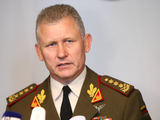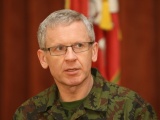Alongside the Lithuanians, all Americans and the Japanese, around 230 people in total, will leave too. The upcoming changes are giving mixed feelings as troops are sure of having completed their task, and civilians are concerned about the continuity of their work.
Soldiers have done their job, the chief of defense says.
Chief of Defense of Lithuania Lieutenant General Arvydas Pocius, who paid a visit to Ghor earlier this week, told journalists that in the military viewpoint, Lithuania's presence in the Afghan province should be seen as a success.
 |
| Arvydas Pocius |
"In my opinion, we can proudly say that Lithuania, which established a Provincial Reconstruction Team in Ghor province in 2005, is leaving with its head up high," Pocius said.
"The city of Chagcharan has nearly doubled in size, we see new technologies that came here. We see antennas, solar panels, people talking on mobile phones. This is also our contribution along with supporting countries," said the chief of defense.
Until now, one Lithuanian soldier – sergeant Arūnas Jarmalavičius – died in Ghor, a few were injured but successfully recovered.
"If we were to look at other provinces, other reconstruction teams or other projects in Afghanistan, I would really say it is a result of good cooperation with the local administration and good relations with local residents," Pocius said.
Thousands of Talibs and criminals in the province?
When presenting the security situation to Pocius' delegation, Ghor officials provided a scheme picturing the security level in the province. One region was pictured in green, which means the highest degree of security, two were yellow and the remaining parts, including Chagcharan, were red.
"He said that there are 100 Talib groups involving a total of 1,810 persons. They are active and disturb security in all of the Ghor province," a local interpreter translated the words of one of the officers of Afghanistan's National Army to the delegation.
"There are 102 illegal groups consisting of 6,500 people performing dangerous operations in the Ghor province. They trigger tribe conflicts, fights and suicide attacks in central Ghor, i.e., Chagcharan, thus affecting security of all of the province," the interpreter continued.
The picture of the situation given by the local forces left PRT Public Relations Officer Captain Ainaras Jonaitis astonished. In his opinion, Afghan power structures tend to treat the situation differently, while the provided numbers do not reflect the factual number of fighters but possibly "background for generation of capacities of relevant size." In Jonaitis' words, the numbers should not be viewed unambivalently.
"I'm not sure but maybe they meant the entire Western region?.. If there were that many Talibs in Ghor, there would be open hostilities. (...) Maybe by indicating the numbers, the officials did not only mean the Taliban fighters but also criminal structures operating in the province, as well as the residents who don't support the province's legitimate administration and coalition forces? There is healthy competition among the local security forces, while specific units are responsible for security, therefore, we sometimes see them wanting to do better than the others," Jonaitis, the PRT public relations officer, told BNS.
The Lithuanian Army said the level of insecurity was high in only one district of Ghor - Pasaband, while threats in other parts of the province are marked as rather low.
Ghor's administration is alarmed by the withdrawal of Japan's civilians, not Lithuanian troops
Meanwhile, Ghor's Deputy Governor Mohamad Amin Tokhy told Lithuanian journalists he has no fears in connection to the Lithuanian withdrawal.
"Given that our security forces have been stepped up and have more capacities than they did last year, we expect them to be able to ensure security," he said.
The official was more alarmed by the closure of Japan's Development Cooperation bureau.
"Of course, we are alarmed about it. I hope that after closure of the Japanese civilian bureau here Japan will continue development projects in the province," the Afghan official noted.
Diplomats want independent Afghanistan, fair upcoming elections
Gintaras Bagdonas, the commander of Lithuania's special mission to Afghanistan, emphasized that "people of Afghanistan are independent and we should trust that the local population will manage to preserve and continue the efforts of Lithuania, Japan, the United States and other international donors."
 |
| Gintaras Bagdonas |
"We should probably trust them. Their culture may be different, they may act differently, we may criticize them once in a while – it is a different world, we shouldn't expect Switzerland or even Lithuania here. They will defend themselves and have to do everything themselves. And they are doing this, many projects are the result of their work," said Bagdonas when asked about the fate of the completed and the unfinished civilian projects after Lithuania closes down its PRT camp.
"You can never do everything all the time. (...) By providing security, we manage to attract countries like Japan and the United States, which spent just over 100 million US dollars here," he added.
According to information available to Bagdonas, the US and Japan have each earmarked about 50 million US dollars (about LTL 133m or EUR 38m), while Lithuania allocated 16.7 million litas on projects in Afghanistan, with the bulk going to Ghor.
The diplomat emphasized that the international community is committed to supporting Afghanistan even after withdrawal of coalition forces, however, in his words, Kabul should "do homework."
"One of the most important tasks is the future (presidential) elections, preparations for the elections, conducting them in a democratic manner and in line with the population's expectations. A lot is expected from the elections. The country must be responsible for itself, it is already starting to be," said Bagdonas.
Informally – ambivalent sentiments
Nevertheless, the atmosphere in the Lithuanian camp in Afghanistan features an unmistakable shadow of concern. Even with close monitoring of PRT civilian element, projects are implemented for years, and the infrastructure built for donor money is mauled by defects signifying the local work culture and one-day approach.
"Before leaving for Afghanistan, I could not understand how one can fail to control the way money is spent. After spending some time here, I understand," a Lithuanian officer said during the delegation's tour of a Chagcharan building built for funds from Lithuania and Japan.
In his words, he has heard all types of explanations for unfinished work or need of repairs.
Asked to specify about supervision of the projects after the Western and Japanese representatives leave Ghor, he could not give an answer.
Lithuanian troops are also familiar with Afghanistan's casual stance on technical aspects.
Over the three days of the stay in Afghanistan, the prevailing opinion was that the locals would probably manage to ensure security, however, both official and private statements were that the people needed further training.
Lithuania intends to close the PRT in Ghor in the last weeks of summer and withdraw all forces from the province by September.






























